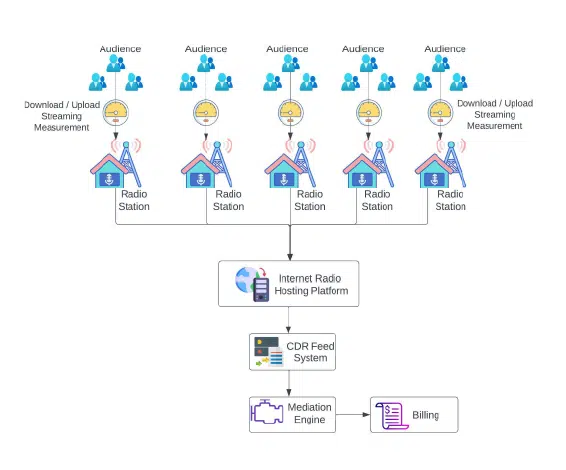Case Study – Consumption Billing for an Internet Radio Streaming Company
COMPANY
INDUSTRYStreaming Services CHALLENGE
SOLUTIONjBilling On-premise deployment with:
RESULTS
|
About the Client
This is a case study of a company based in the US which provides the hosting and internet streaming services. Their business model is to provide these services to the Radio Stations so that these stations can avail the streaming service over the internet and reach more and more audience over the internet. They have about 400 Radio Stations as their customers.
Challenge
The requirement was to measure the upstream and downstream transmission of content and charge each radio station as per their streaming consumption. The client required a billing mediation system which can be customised to meet this complex billing requirement and the one on which they could rely on for automated billing ops. They needed a system that can cater to increasing loads with on-boarding of new accounts on their streaming platform.
The additional challenges stemmed from being able to support custom pricing rules and applying customer special pricing when needed. Also, customised invoice templates with branding and some specific changes in the invoice formats per customer accounts.
Solution
The jBilling‘s billing mediation system fit the bill as it has been proven to be both flexible and robust billing mediation system. The jBilling system provides a customisation framework which helps companies to extend the system functionality with relative ease and without affecting the core billing system.

Billing Mediation helps Rating and Charging of the Internet Radio Streaming
The above diagram depicts the working of consumption billing implemented for this project. You can see multiple radio stations in the diagram streaming live content and audience are shown connected to these stations over the internet. Each audience endpoint represents a streaming session with the radio station.
The client’s hosting platform measures the consumption of bytes of data that a particular Radio Station is streaming upstream and downstream (considering audience at the other end). The streaming platform (Internet Radio Hosting Platform in the diagram) generates the UDR (Usage Data Record) files with the upstream bytes and downstream bytes recorded in each session for each Radio Station. The Usage Data Records are similar to Call Data Records (CDRs) in a Telecom system.
In jBilling, all the 400 Radio Stations were mapped as customers. The billing mediation engine from jBilling resolves each UDR record to be charged to a particular customer (or Radio Station). The consumption charges were being applied at either a predefined flat rate, or with tiered pricing or with customer specific special pricing. The pricing varied for each customer account, depending on the plan or based on the agreement with the customer for any special pricing, covering the discounts in some cases.
All the events from the streaming sessions were recorded in the billing mediation system as rated events. These rated events were stored in a persistent database store and made available to customers on demand to review their usage charging. This gave a complete transparency to the customers on how their usage was being charged. The increase in streaming consumption was a happy business scenario for the customers and this is where innovative pricing was applied to encourage the business growth for the customers.
The rate for upstream bytes was higher than the rate for the downstream bytes. The upstream and downstream pricing was maintained differently on different plans. The jBilling pricing engine handled the various pricing preferences for customers through a pricing hierarchy that decides the final price to be charged based on:
- the plan that the customer has chosen,
- if there is a customer special price coming from the contract, or,
- bundled product pricing, and,
- discount (one time discount or period based discount)
The billing mediation system applies the consumption charges by accumulating the charges coming from all streaming sessions to the respective radio stations (or customers in jBilling). The accumulated charges are then applied conveniently in the billing process onto the customer invoice. The customers can have different billing cycles, following a monthly anniversary cycle.
For each month’s billing cycle for each customer, the accumulated charges are tracked separately and billed onto separate monthly invoices. The whole process was seamless and provided customers with an easy view to understand how the usage consumption was measured and charged.
Results
The bulk work of this implementation was to get the usage rating engine tested and certified for the Production use. Once in Production, the system was stable in no time. The evaluation of the rating and charging was found to be accurate, in a very complex streaming environment.
This resulted in increased confidence of our client in providing their business offerings to more and more prospects. The ease with which the mediation rating solution could scale for greater UDR loads, opened up new business avenues for our client.
“jBilling changed the way billing was done and allowed our client to focus on their business, than looking into billing issues”.

